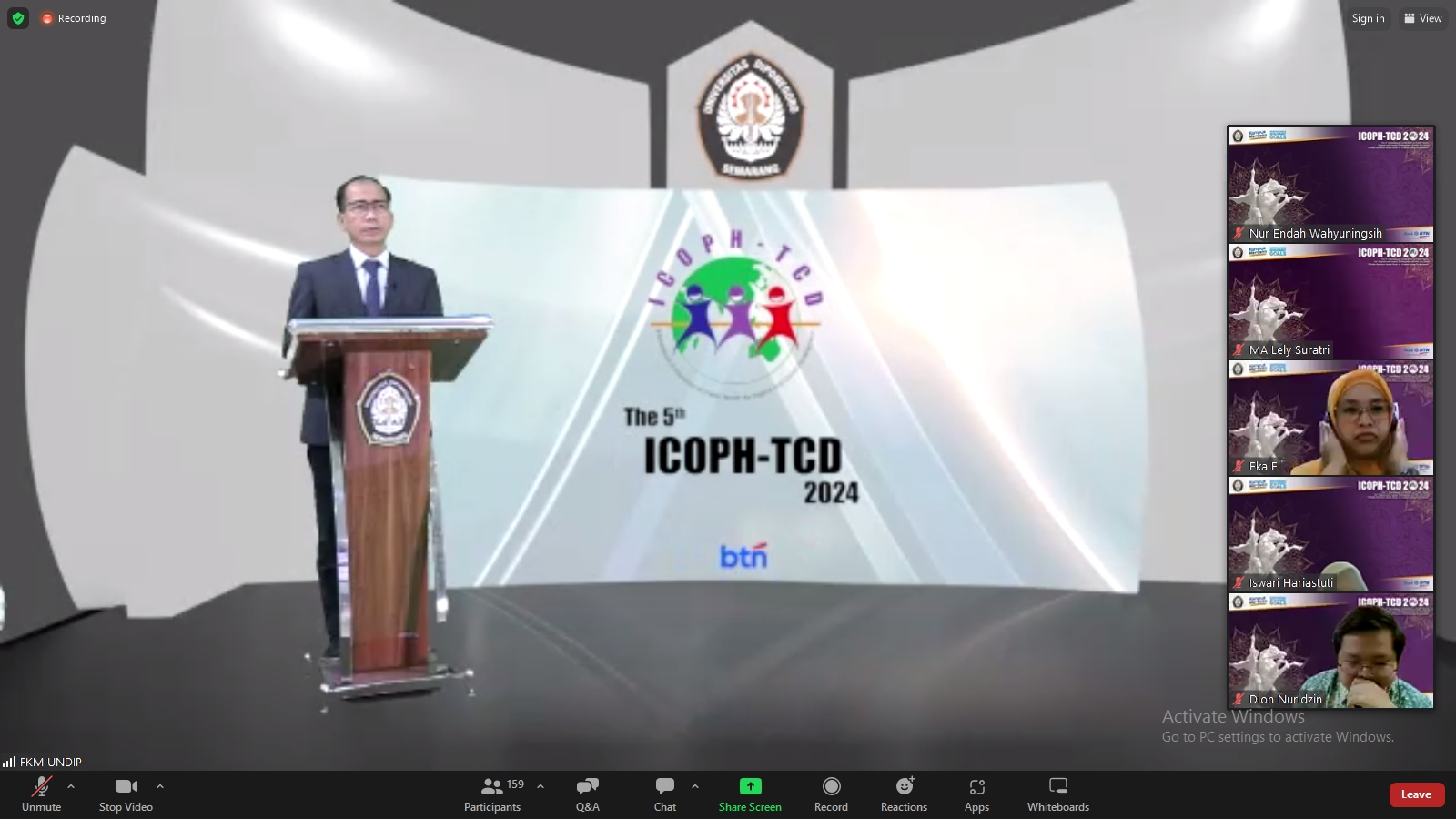Semarang (7/31)- Climate change is causing challenges in coastal and tropical environments. Rising sea levels, intensifying storms, coastal erosion and changing rainfall patterns are increasing the vulnerability of these regions to extreme weather events, flooding and the spread of disease. These climate-induced changes have direct and indirect consequences for human health, making it critical to comprehensively understand, anticipate and mitigate the associated risks. Health system changes and the development of strategies to strengthen public health resilience are essential in the face of climate change. On July 30-31, 2024, the Faculty of Public Health has organized the 5th International Conference of Public Health for Tropical and Coastal Region (ICOPH-TCD) Web Conference entitled “Climate-Sensitive Health Risks on Coastal Living Environment”.


This event presented 6 speakers from various countries such as Indonesia, Malaysia, Taiwan, England, and America. The event began with an opening speech by the Dean of the Faculty of Public Health, Diponegoro University, Dr. Budiyono SKM, M.Kes. In his speech, the Dean mentioned that climate change refers to significant and long-term changes in the Earth’s climate, including temperature, rainfall, and wind patterns. These changes are largely caused by human activities and impact health risks in coastal environments. The Dean added in his speech that “this conference is an excellent opportunity to initiate collaboration in education, research, and innovation among various institutions. After we successfully organized ICOPH-TCD in 2016, 2018, 2020, and 2022 with more than 1000 participants, we are proud to continue the international recognition to share research and best practices from our colleagues around the world”.

The event continued with a welcoming speech by the Rector of Diponegoro University represented by the Head of Reputation Office, Prof. Dr. Hadiyanto, ST, M,Sc. Followed by the keynote speaker presentation from dr. Dr. Anas Ma’ruf from the Director of Environmental Health of the Ministry of Health of the Republic of Indonesia. Dr. Anas said that “Climate change and air pollution significantly affect the coastal living environment in various ways, affecting natural ecosystems and human activities. Scientific evidence, diverse expertise and global experience, including local, traditional and customary knowledge, systems and practices, have significantly improved responses to climate change and health. However, investments in research are needed to support appropriate policy responses with co-benefits for health and the environment”.


The presentation on the first day was delivered by Professor Hsiao-Yu Yang (National Taiwan University, Taiwan) and Dr. Bernadette O’Hare (Infection And Global Health, School of Medicine, University Of St. Andrews, United Kingdom). While on the second day, the material was delivered by Professor Elena N. Naumova, Ph.D (Tufts University, USA), Professor Dra. R.A. Yayi Suryo Prabandari, M, Si, ph.D (Gadjahmada University, Indonesia), Professor Hanifa Maher Denny, BSPH., MPH, ph.D (Faculty of Public Health, Diponegoro University) and Professor Dr. Juliana Binti Jalaludin (Faculty of Medicine and Health Sciences, Universiti Putra Malaysia, Malaysia).




Muh Fauzi SKM, Ph.D as the chief organizer of the 5th ICOPH TCD 2024 said that this event was attended by 235 participants from within and outside the country. A total of 208 participants also disseminated their research results and ideas related to public health in oral presentations in parallel sessions. At the end of the event, it was announced that Nabihah Ali, participant from Malaysia, was chosen as the general best presenter.
“ the topic raised is very interesting and relevant to Indonesia’s current conditions, namley climate change which affects all elements of life, including health –related behavior, said one of the participant who participated in this conference.

At the end of the event, the performance of 2 dancers accompanied by Javanese pop music by Studio 8 ended the web conference which had been held for 2 days. The Faculty of Public Health, Diponegoro University hopes that this activity can provide insight to participants related to public health in general and strengthening health systems and developing strategies for community resilience in the face of climate change in particular. In addition, it is also hoped that this activity can open up opportunities for cooperation and collaboration with other institutions both at home and abroad.

